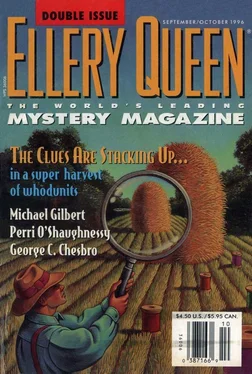Doug Allyn - v108 n03-04_1996-09-10
Здесь есть возможность читать онлайн «Doug Allyn - v108 n03-04_1996-09-10» весь текст электронной книги совершенно бесплатно (целиком полную версию без сокращений). В некоторых случаях можно слушать аудио, скачать через торрент в формате fb2 и присутствует краткое содержание. Город: Dell Magazines, Год выпуска: 1996, Издательство: Dell Magazines, Жанр: Детектив, на английском языке. Описание произведения, (предисловие) а так же отзывы посетителей доступны на портале библиотеки ЛибКат.
- Название:v108 n03-04_1996-09-10
- Автор:
- Издательство:Dell Magazines
- Жанр:
- Год:1996
- Город:Dell Magazines
- ISBN:нет данных
- Рейтинг книги:4 / 5. Голосов: 1
-
Избранное:Добавить в избранное
- Отзывы:
-
Ваша оценка:
- 80
- 1
- 2
- 3
- 4
- 5
v108 n03-04_1996-09-10: краткое содержание, описание и аннотация
Предлагаем к чтению аннотацию, описание, краткое содержание или предисловие (зависит от того, что написал сам автор книги «v108 n03-04_1996-09-10»). Если вы не нашли необходимую информацию о книге — напишите в комментариях, мы постараемся отыскать её.
v108 n03-04_1996-09-10 — читать онлайн бесплатно полную книгу (весь текст) целиком
Ниже представлен текст книги, разбитый по страницам. Система сохранения места последней прочитанной страницы, позволяет с удобством читать онлайн бесплатно книгу «v108 n03-04_1996-09-10», без необходимости каждый раз заново искать на чём Вы остановились. Поставьте закладку, и сможете в любой момент перейти на страницу, на которой закончили чтение.
Интервал:
Закладка:
Things remained tense in the town and Sheriff Gunther moved Charlie and Joe to the county jail, which was about thirty miles away. The judge had ordered them held without bond until the preliminary hearing. The wake for Paul McKitrick was held the next day. I got out my one decent sport jacket and stayed at the funeral home with Carol and Christene. To make things more tragically ironic, Christene confided to us that she was two months pregnant.
“I don’t know what to do now,” she said.
“I’ve always wanted a baby sister,” Carol told her reassuringly.
Practically the whole town showed up for the wake, and it was early evening when we got back to Carol’s. As I pulled into the driveway, everything looked normal. But when we got to the door, I saw that the jamb was splintered.
“What’s that?” Carol asked.
“Stay here,” I said. “Somebody must have broken in.”
I cautiously pushed the door open and looked inside. The drapes had been drawn and it was pretty dark. I reached for the light switch and flipped it on. Nothing seemed out of place. The only damage I found was in the main study, which McKitrick had used as his office. Everything was turned upside down. Papers were strewn everywhere, and the locked desk drawer of McKitrick’s big oak desk had been pried open.
When the sheriff got there, he chastised me for going through the house before calling him.
“I’ve got enough problems without somebody surprising a burglar and maybe getting shot,” he snapped. “Now go stay in the kitchen, all of you, till we can process the scene.”
Christene suddenly began to feel ill, and Carol helped her upstairs to her room. As I sat at the kitchen table, the phone began ringing. After about five rings I figured that the women were still busy, so I answered it.
“McKitrick residence,” I said.
“This is Dr. Frank Hardy,” a masculine voice said. “To whom am I speaking?”
I identified myself, and asked if I could help him.
“I was out of town for a few days,” the caller said, “and I just heard about Mr. McKitrick.”
“I see, Doctor. Did you know him well?”
“Not really,” Hardy said. “My practice is located in Buffrington. Mr. McKitrick sought out my services about a month ago.”
Buffrington was the next large city to the north of Pueblo. It was a good fifty miles away.
“I see,” I said, somewhat perplexed.
“In fact, I just sent Mr. McKitrick a letter he requested a few days ago. You can imagine my surprise when I found out he’d passed away.” He exhaled loudly, then continued. “I do have a slight problem, of a somewhat sensitive nature. You see, the bill for the tests I did for Mr. McKitrick has not been paid.”
I rubbed my hand over my forehead and asked him for his address and phone number. “I’ll have the family attorney get in touch with you,” I said.
“The invoice was enclosed in the letter,” he said genially.
“I’ll look for it,” I said. And as I hung up, something stirred in the back of my memory.
Hours later, I found Dr. Hardy’s letter in the pocket of my jacket, which I’d absentmindedly hung over the back of a chair in my room. I remembered pocketing the McKitrick mail the day after the murder. The call from Hardy had seemed annoying at the time, but my curiosity as to the nature of the tests kept gnawing at me. Why would McKitrick have gone all the way up to Buffrington when he had a family doctor right here in Pueblo? Was the letter something that was going to cause more grief for Carol and Christene?
The steam from the teakettle rose upward, accompanied by a sharp whistle that seemed like an alarm signal for my guilty conscience. But by the time I had the flap worked open, I had rationalized that I was doing it for the greater good: trying to shield the girl I loved from any needless pain.
The letter, with Dr. Hardy’s invoice inside, documented the results of some DNA tests that McKitrick had requested on himself and Carol. I remembered that she’d told me casually that Christene, her father, and she had blood drawn about a month ago after a trip to Mexico, but Mr. McKitrick had said that it was to check for hepatitis.
I read the letter over twice before I accepted what it said: The results of the tests on Paul and Carol McKitrick showed conclusively negative patterns. Carol was not his natural daughter.
After the funeral, the house was full of mourners and I finally told Carol that I had to get out for a while. I left her surrounded by relatives and drove back to the gun shop. The front door still had the Gone Fishin’ sign on it, so I let myself in the back. I wanted to ask Uncle Dede’s advice about what to do with the letter, but couldn’t bring myself to talk about it. Instead, I asked him what kind of a man Paul McKitrick had been. Even though Carol and I were engaged, Mr. McKitrick had always seemed distant to me. Maybe, I thought, if I knew more about the man I’d be able to figure out what to do.
“He was what you might call a collector,” Uncle Dede said, leaning back from the tabletop. “He always had to be in total control, or seem like he was if he wasn’t. And it really bothered him if he wasn’t. Not that he didn’t lose occasionally, but he hated to. And would always try to cover it, if he could.”
“Just like the treaty war with the Indians,” I said.
Uncle Dede nodded and smiled.
“Now, you want to tell me what’s bothering you, Rick?”
“You can see right through me, can’t you?” I told him about the letter, which I’d stowed in my lab locker for safekeeping. Uncle Dede bit his lip when I mentioned the contents.
“Only one thing you can do at this point,” he said. “Go get that letter and turn it over to McKitrick’s lawyer.
“Mason Gilbert? Do you think that’s wise? What’ll that do to Carol?”
“McKitrick might already have confided in him,” Uncle Dede said. “Whatever his reasons were, and I suspect, knowing him, they weren’t good, you can’t afford to put yourself in the middle of something like this.”
I sat silently pondering what he said.
“If you love Carol, Rick,” Uncle Dede said, “I think you’ll see it’s the right thing to do.”
Our conversation was interrupted by the phone. It was Sheriff Gunther. He told Uncle Dede that a group of Indians had driven through the north end of town and taken a couple of shots at one of the squad cars. The sheriff wanted Uncle Dede to get in uniform and ride shotgun patrolling the main highway between the town and the reservation. Uncle Dede told him he’d be right there. He hung up the phone and looked at me.
“So what you gonna do?” he asked.
“Drive up to Deming and talk to Mason Gilbert,” I said.
He smiled fractionally, then put both hands on my shoulders.
“I’m proud of you, Rick. But do me a favor. Let me call Sonny to ride up there with you. With all these Indian problems, the sight of a lone driver on the highway is asking for trouble.”
“Okay,” I said. “I’ll shoot over to the lab and pick up the letter and meet him back here.”
If Sonny was worried about the Indians, he didn’t show it as we drove north toward Deming, past the Reservation. He nonchalantly flicked a coarse thumbnail over the end of one of those wooden kitchen matches and lit his cigarette. The big twelve-gauge shotgun on his lap seemed reassuring.
A squad car passed us as we drove by the Reservation. In a few more minutes we’d be nearing the turnoff for Carol’s.
“Hold on a second,” Sonny said, his eyes narrowing on the roadway ahead. “Slow it down.”
I stared ahead, but saw nothing out of the ordinary.
“Why?” I asked. “You see something?”
“You see this?” he retorted harshly as he slammed the slide of the shotgun back, then forward, chambering a round. The hollow tubelike end of the barrel rested on my shoulder, pointing at my head.
Читать дальшеИнтервал:
Закладка:
Похожие книги на «v108 n03-04_1996-09-10»
Представляем Вашему вниманию похожие книги на «v108 n03-04_1996-09-10» списком для выбора. Мы отобрали схожую по названию и смыслу литературу в надежде предоставить читателям больше вариантов отыскать новые, интересные, ещё непрочитанные произведения.
Обсуждение, отзывы о книге «v108 n03-04_1996-09-10» и просто собственные мнения читателей. Оставьте ваши комментарии, напишите, что Вы думаете о произведении, его смысле или главных героях. Укажите что конкретно понравилось, а что нет, и почему Вы так считаете.












